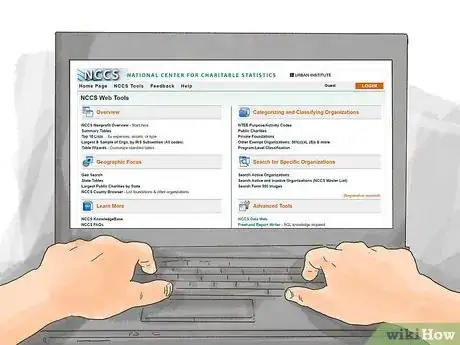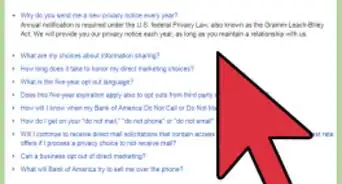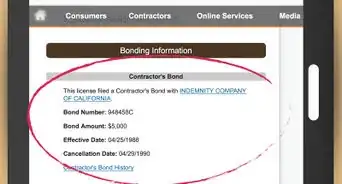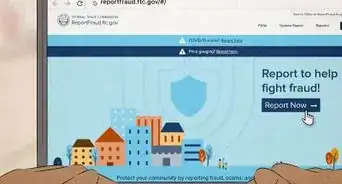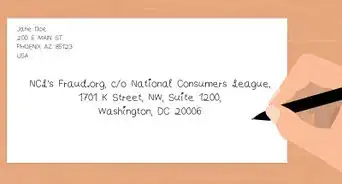This article was co-authored by Clinton M. Sandvick, JD, PhD. Clinton M. Sandvick worked as a civil litigator in California for over 7 years. He received his JD from the University of Wisconsin-Madison in 1998 and his PhD in American History from the University of Oregon in 2013.
There are 8 references cited in this article, which can be found at the bottom of the page.
This article has been viewed 73,902 times.
In recent years, people are more closely scrutinizing charities and nonprofit companies before making a charitable donation, volunteering for service or seeking employment. There are numerous ways that you can evaluate a charity or nonprofit based on the percentage of donations that are used for direct services, the financial viability of the company and how employees describe the company as a place to work. Before aligning yourself with a charity or nonprofit, you should investigate the company to ensure that you are investing in a trustworthy organization.
Steps
Gathering Information About a Nonprofit Company
-
1Read the company’s website. Learning the basic facts about an organization is an important first step to conducting an accurate and thorough investigation. You should begin your search by reading what the company writes about itself.
- A nonprofit’s own website is a good place to start gathering information. Nonprofit websites generally provide extensive background information on the charity and its programs, as well as financial summaries and tax filing information.
- Contact the organization directly and request written information on its charitable activities and finances. Reputable charities already have this type of information prepared and ready to send out.
-
2Contact government agencies. Secretaries of State, Departments of State, Attorney Generals, or Consumer Services Departments may have important information on a nonprofit organization. Government agencies maintain information for nonprofits that registered to do business in the state, are required to register as a charity under state law, or became a legal entity, such as an LLC, in a particular state. Many of these government agencies offer searchable databases for consumers to obtain information on registered business entities and/or nonprofits.
- For a list of state-by-state searchable databases for corporations and secretary of state websites visit: http://www.coordinatedlegal.com/SecretaryOfState.html
Advertisement -
3Search the National Directory of Nonprofit Organizations. The National Directory of Nonprofit Organizations (NDNO) provides information on nonprofits with annual incomes of at least $25,000. You can usually find a copy of the NDNO at your local library. By searching the NDNO you may be able to determine the following information:
- The name, mailing address, and phone number (when available) of the company;
- The company’s IRS filing status, including the IRS nonprofit category.
- The company’s employer identification number.
- The company’s reported annual income as set forth on its IRS form 990.
- You may also be able to search this database online if a library has a subscription to the company that manages the NDNO’s electronic database.[1]
-
4Search the Encyclopedia of Associations. The Encyclopedia of Associations provides detailed information on U.S. nonprofit organizations with a national scope. You can usually find a copy of the Encyclopedia at your local library. By searching the Encyclopedia you may be able to determine the following information:
- The name and contact information for the organization.
- Information about company contacts, members and staff.
- Information about the company’s founding.
- The approximate annual budget.
- The number of regional, national and local groups affiliated with the company.
- You may also be able to search this database online if a library has a subscription to the company that manages the Encyclopedia’s electronic database.[2]
-
5Analyze an organization's annual reports. Nonprofit annual reports highlight the organization's mission and impact, thank volunteers and supporters, and make case for donating to the organization. Annual reports are one way an organization can be transparent and honest about what they have been doing the year before. They will document what was accomplished, what they fell short on, and what lies ahead. Most importantly, the annual report will include financial documents illustrating revenues and expenses.[3]
- Read several years worth of reports to get an idea of how the organization's outlook has changed over time and the types of challenges they have faced.
Determining Whether the Not-For-Profit Has a Good Reputation for Donations
-
1Check the organization’s tax-exempt status. A tax-exempt organization is one that the Internal Revenue Service (“IRS”) has recognized as a charitable organization and has exempted it from the obligation to pay income tax. You can check whether an organization’s tax-exempt status and determine whether your donation would be tax deductible in the following ways:
- Search the IRS tax-exempt database. The IRS offers a searchable database so that consumers may check on an organization’s tax-exempt status. You may access the database on the IRS website at: http://apps.irs.gov/app/eos/.
- Check the IRS’ list of revocations. The IRS offers a searchable list of organizations whose tax-exempt status has recently been revoked. After verifying that an organization has been granted tax-exempt status, check the list to ensure it has not been revoked. You may search the list by visiting: https://www.irs.gov/charities-non-profits/charitable-organizations/revocations-of-501c3-determinations.
-
2Search nonprofit and charity indexes. Many online indexes offer free background and financial information on many nonprofit organizations. These organizations investigate nonprofits to determine how the company spends its money and whether it is a worthwhile investment for consumers.[4]
-
3Search the National Center for Charitable Statistics (“NCCS”). The NCCS is a clearinghouse of data for nonprofit organizations. The center works with government agencies, including the IRS, private organizations, and the scholarly community to develop its databases and provide the public with standard information regarding the activities of various charities.[5]
-
4Search the Charitable Choices’ website. Charitable Choices provides nonprofits a way to promote their charities and organizations through their online index and through their four yearly charity guides. In order to be listed in a Charitable Choices guide, an organization must meet certain standards, including revealing the percentage of funds spent on fundraising and administrative costs and providing certain financial information on a regular basis. You can search Charitable Choices online index at http://www.charitychoices.com.
-
5Search Charities Review Council’s website. The Charities Review Council provides a searchable index of nonprofits, all of whom have voluntarily met the Council’s accountability standards.[6] You may search the index at http://www.smartgivers.org.
-
6Consult consumer advocate organizations. Many consumer advocate organizations investigate nonprofits and charities, publish financial information and ratings, and expose scams and fraudulent organizations on their websites. Some reputable organizations that investigate nonprofits and publish their findings, free of charge, include:
- GuideStar, which is a well-known and reputable nonprofit organization that gathers and publishes important information about other nonprofits on its website. You may search GuideStar’s nonprofit database at http://www2.guidestar.org/home.aspx.
- Consumer Reports WebWatch investigates websites claiming to be nonprofits, or that claim to be collecting for and donating to a nonprofit. Consumer Reports publishes its findings on its site in a searchable database, which is located at: http://www.consumerwebwatch.org/non-profit.cfm.
- The Wise Giving Alliance, which is run by the Better Business Bureau (“BBB”), investigates nonprofits and publishes reviews based upon 23 standards that include topics such as use of funds, public accountability, and ethical fundraising. The website is located at: http://give.org.
- Charity Watch is a well-known organization that acts as a charity watchdog, evaluating and rating charities and publishing the results of its evaluations and in-depth background information in an A to Z listing on its website. You may search the Charity Watch website at: http://www.charitywatch.org/.
- Charity Navigator is a reputable nonprofit organization that evaluates and rates charities. It publishes its ratings for hundreds of charities and nonprofit organizations on its website at http://www.charitynavigator.org/.
-
7Talk with an organization's development director. A nonprofit's development director is responsible for the fundraising activities of the organization. While these employees will often be biased because it is their job to solicit donations and talk up their organization, you can often get a lot of information from them. Call the nonprofit you are investigating and ask to speak with their fundraiser or development director. Try to set up a time to talk with them face-to-face. If that doesn't work, talk with them over the phone.
- Ask them about their role within the organization and the success they have been having. Ask them how many grants they apply for each year and how many of those applications are successful. You can also ask for dollar amounts regarding how much money they have asked for and how much they have earned. Asking these types of questions will give you a good idea of an organization's fundraising success.
Determining Whether the Nonprofit Company is a Viable and Good Place to Work
-
1Review the organization’s IRS Form 990. Before accepting a position at a nonprofit company, you should check to see whether the company is financially viable. Each year, a nonprofit company with gross annual receipts of $25,000 or more, must file a Form 990 with the IRS, which discloses a number of financial facts about the company, including, but not limited to the names and compensation of its officers and trustees, its highest paid employees and contractors, and an itemization of its expenditures. To get a copy of a nonprofit company’s Form 990:
- You can search online for a nonprofit’s Form 990 at: https://projects.propublica.org/nonprofits/
- Contact the nonprofit company and ask if they can mail you a copy.
- Request it from the IRS. Scanned images of all Form 990 filings for a specific tax year are available directly from the IRS on a CD or DVD for a small fee. You can request a specific 990 by filing an IRS Form 4506. Form 4506 is available on the IRS website at: http://www.irs.gov/pub/irs-pdf/f4506a.pdf.
- Request it from a third party. Many of the consumer advocate groups and online charity indexes discussed above include copies of nonprofits’ Form 990 and other IRS filings along with the background and financial information provided on their databases.
-
2Review the company’s United States Census Bureau (“Census Bureau”) filings. Non-profit organizations that receive $500,000 or more in federal awards or grants must perform a Single Audit and complete Census Bureau form SF-SAC for every year that they meet the dollar threshold. The Audit determines how the nonprofit spent federal awards, or grants, during the filing year and form SF-SAC reports this information to the Census Bureau.
-
3Conduct informational interviews. Informational interviews are informal conversations with people in a professional field that interests you. Taking part in informational interviews will give you a first-hand view of what it is like to work in a particular field and you will get tips from people about what it takes to succeed in interviews and jobs. These interactions will also give you the opportunity to expand your professional network and keep in touch with influential people. To conduct an informational interview:
- Research career fields. Find job titles that interest you based on your educational and experiential background.
- Identify people to interview. Once you know what jobs you want, find people that already have those jobs. You can ask your friends and family if they know anyone with a specific job title; you can call organizations directly; or you can read relevant news articles to learn about people in your field.
- Prepare for the interview. You need to develop a short introduction so you can tell the person who you are and why you are calling. Plan a number of open-ended questions you can ask in order to solicit information about the job the person holds, how they got it, and how someone like you can get a similar job.
- Call the other person. When you are ready, call the person and mention how you got their information. Ask if they have a few minutes to talk and introduce yourself. Ask if you can meet with them in person to ask them a few questions about their job. Be sure you emphasize the fact you are looking for information and not a job.
- Conduct the interview. When the day comes, go to your informational interview. Dress as if you were going to a job interview and arrive early. Introduce yourself and start asking your questions. Go with the flow and take notes if you need to. Always ask if they have any other contacts you could talk to about these types of jobs as well.
- Follow-up. When your interview is over, follow-up within a day or two. Send them a thank you note and let them know you appreciate their time. Keep in touch with the person and let them know how you are using their advice.[7]
-
4Search online for reviews of the company. Before you accept a position at a nonprofit company, you should read how previous and current employees speak of the organization as a place to work. There are online websites that collect information from previous employees and allow individuals to search this information for free. To locate a websites that reviews employers, conduct an internet search for “online company reviews from employees.” Once you locate a website, search for the nonprofit’s name and carefully read the reviews.
-
5Ask about employee turnover. If you are interviewed for a position at a nonprofit company, you should ask about the rate of employee turnover. Nonprofit companies have a very high rate of employee burnout.[8] If the company has a high employee turnover rate you should consider the following:
- Measure the potential experience you could get at the company against the burdensome workload and likelihood of burnout. If you understand that most employees only work for the company for a few years, ask yourself whether you can get enough transferrable experience in that time to make the position worthwhile.
- Determine whether you feel passionate about the work being done at the company. One of the ways to prevent burnout is to involve yourself in work that you feel passionate about and for which you can see demonstrated results. This may make the work and the company a worthwhile choice for you.
Warnings
- When conducting online investigations and research, be aware that not all information encountered on the internet can be trusted. Be sure that any information upon which you rely is from a trustworthy source.⧼thumbs_response⧽
- A .org domain does not mean that the owner of the website is a charity or nonprofit. Anyone may purchase a domain name ending in .org.⧼thumbs_response⧽
References
- ↑ http://find.galegroup.com/gdl/help/GDLeDirNDNOHelp.html
- ↑ http://find.galegroup.com/gdl/help/GDLeDirEAHelp.html
- ↑ https://www.councilofnonprofits.org/tools-resources/nonprofit-annual-reports
- ↑ http://money.usnews.com/money/blogs/my-money/2014/12/10/how-to-tell-if-a-charity-is-legitimate
- ↑ https://nccs.urban.org/
- ↑ https://smartgivers.org/about/
- ↑ https://career.berkeley.edu/Info/InfoInterview
- ↑ http://www.casefoundation.org/blog/pros-and-cons-working-nonprofit-sector/







